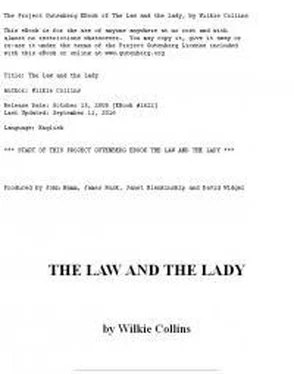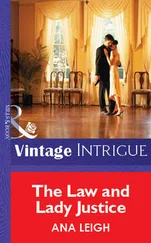Уилки Коллинз - The Law and the Lady
Здесь есть возможность читать онлайн «Уилки Коллинз - The Law and the Lady» весь текст электронной книги совершенно бесплатно (целиком полную версию без сокращений). В некоторых случаях можно слушать аудио, скачать через торрент в формате fb2 и присутствует краткое содержание. Год выпуска: 1999, Жанр: Классическая проза, на английском языке. Описание произведения, (предисловие) а так же отзывы посетителей доступны на портале библиотеки ЛибКат.
- Название:The Law and the Lady
- Автор:
- Жанр:
- Год:1999
- ISBN:нет данных
- Рейтинг книги:5 / 5. Голосов: 1
-
Избранное:Добавить в избранное
- Отзывы:
-
Ваша оценка:
- 100
- 1
- 2
- 3
- 4
- 5
The Law and the Lady: краткое содержание, описание и аннотация
Предлагаем к чтению аннотацию, описание, краткое содержание или предисловие (зависит от того, что написал сам автор книги «The Law and the Lady»). Если вы не нашли необходимую информацию о книге — напишите в комментариях, мы постараемся отыскать её.
The Law and the Lady — читать онлайн бесплатно полную книгу (весь текст) целиком
Ниже представлен текст книги, разбитый по страницам. Система сохранения места последней прочитанной страницы, позволяет с удобством читать онлайн бесплатно книгу «The Law and the Lady», без необходимости каждый раз заново искать на чём Вы остановились. Поставьте закладку, и сможете в любой момент перейти на страницу, на которой закончили чтение.
Интервал:
Закладка:
With a strong emphasis on the last words, my worthy adviser, mindful of the flight of time and the claims of business, rose to take his leave.
“One word more,” I said, as he held out his hand. “Can you manage to see Miserrimus Dexter before you go back to Edinburgh? From what the gardener told me, his brother must be with him by this time. It would be a relief to me to hear the latest news of him, and to hear it from you.”
“It is part of my business in London to see him,” said Mr. Playmore. “But mind! I have no hope of his recovery; I only wish to satisfy myself that his brother is able and willing to take care of him. So far as we are concerned, Mrs. Eustace, that unhappy man has said his last words.”
He opened the door—stopped—considered—and came back to me.
“With regard to that matter of sending the agent to America,” he resumed—“I propose to have the honor of submitting to you a brief abstract—”
“Oh, Mr. Playmore!”
“A brief abstract in writing, Mrs. Eustace, of the estimated expenses of the whole proceeding. You will be good enough maturely to consider the same, making any remarks on it, tending to economy, which may suggest themselves to your mind at the time. And you will further oblige me, if you approve of the abstract, by yourself filling in the blank space on your check with the needful amount in words and figures. No, madam! I really cannot justify it to my conscience to carry about my person any such loose and reckless document as a blank check. There’s a total disregard of the first claims of prudence and economy implied in this small slip of paper which is nothing less than a flat contradiction of the principles that have governed my whole life. I can’t submit to flat contradiction. Good-morning, Mrs. Eustace—good-morning.”
He laid my check on the table with a low bow, and left me. Among the curious developments of human stupidity which occasionally present themselves to view, surely the least excusable is the stupidity which, to this day, persists in wondering why the Scotch succeed so well in life!
CHAPTER XLII.
MORE SURPRISES.
The same evening I received my “abstract” by the hands of a clerk.
It was an intensely characteristic document. My expenses were remorselessly calculated downward to shillings and even to pence; and our unfortunate messenger’s instructions in respect to his expenditure were reduced to a nicety which must have made his life in America nothing less than a burden to him. In mercy to the man, I took the liberty, when I wrote back to Mr. Playmore, of slightly increasing the indicated amount of the figures which were to appear on the check. I ought to have better known the correspondent whom I had to deal with. Mr. Playmore’s reply (informing me that our emissary had started on his voyage) returned a receipt in due form, and the whole of the surplus money, to the last farthing!
A few hurried lines accompanied the “abstract,” and stated the result of the lawyer’s visit to Miserrimus Dexter.
There was no change for the better—there was no change at all. Mr. Dexter, the brother, had arrived at the house accompanied by a medical man accustomed to the charge of the insane. The new doctor declined to give any definite opinion on the case until he had studied it carefully with plenty of time at his disposal. It had been accordingly arranged that he should remove Miserrimus Dexter to the asylum of which he was the proprietor as soon as the preparations for receiving the patient could be completed. The one difficulty that still remained to be met related to the disposal of the faithful creature who had never left her master, night or day, since the catastrophe had happened. Ariel had no friends and no money. The proprietor of the asylum could not be expected to receive her without the customary payment; and Mr. Dexter’s brother “regretted to say that he was not rich enough to find the money.” A forcible separation from the one human being whom she loved, and a removal in the character of a pauper to a public asylum—such was the prospect which awaited the unfortunate creature unless some one interfered in her favor before the end of the week.
Under these sad circumstances, good Mr. Playmore—passing over the claims of economy in favor of the claims of humanity—suggested that we should privately start a subscription, and offered to head the list liberally himself.
I must have written all these pages to very little purpose if it is necessary for me to add that I instantly sent a letter to Mr. Dexter, the brother, undertaking to be answerable for whatever money was to be required while the subscriptions were being collected, and only stipulating that when Miserrimus Dexter was removed to the asylum, Ariel should accompany him. This was readily conceded. But serious objections were raised when I further requested that she might be permitted to attend on her master in the asylum as she had attended on him in the house. The rules of the establishment forbade it, and the universal practice in such cases forbade it, and so on, and so on. However, by dint of perseverance and persuasion, I so far carried my point as to gain a reasonable concession. During certain hours in the day, and under certain wise restrictions, Ariel was to be allowed the privilege of waiting on the Master in his room, as well as of accompanying him when he was brought out in his chair to take the air in the garden. For the honor of humanity, let me add that the liability which I had undertaken made no very serious demands on my resources. Placed in Benjamin’s charge, our subscription-list prospered. Friends, and even strangers sometimes, opened their hearts and their purses when they heard Ariel’s melancholy story.
The day which followed the day of Mr. Playmore’s visit brought me news from Spain, in a letter from my mother-in-law. To describe what I felt when I broke the seal and read the first lines is simply impossible. Let Mrs. Macallan be heard on this occasion in my place.
Thus she wrote:
“Prepare yourself, my dearest Valeria, for a delightful surprise. Eustace has justified my confidence in him. When he returns to England, he returns—if you will let him—to his wife.
“This resolution, let me hasten to assure you, has not been brought about by any persuasions of mine. It is the natural outgrowth of your husband’s gratitude and your husband’s love. The first words he said to me, when he was able to speak, were these: ‘If I live to return to England, and if I go to Valeria, do you think she will forgive me?’ We can only leave it to you, my dear, to give the answer. If you love us, answer us by return of post.
“Having now told you what he said when I first informed him that you had been his nurse—and remember, if it seem very little, that he is still too weak to speak except with difficulty—I shall purposely keep my letter back for a few days. My object is to give him time to think, and to frankly tell you of it if the interval produce any change in his resolution.
“Three days have passed, and there is no change. He has but one feeling now—he longs for the day which is to unite him again to his wife.
“But there is something else connected with Eustace that you ought to know, and that I ought to tell you.
“Greatly as time and suffering have altered him in many respects, there is no change, Valeria, in the aversion—the horror I may even say—with which he views your idea of inquiring anew into the circumstances which attended the lamentable death of his first wife. It makes no difference to him that you are only animated by a desire to serve his interests. ‘Has she given up that idea? Are you positively sure she has given up that idea?’ Over and over again he has put these questions to me. I have answered—what else could I do in the miserably feeble state in which he still lies?—I have answered in such a manner as to soothe and satisfy him. I have said, ‘Relieve your mind of all anxiety on that subject: Valeria has no choice but to give up the idea; the obstacles in her way have proved to be insurmountable—the obstacles have conquered her.’ This, if you remember, was what I really believed would happen when you and I spoke of that painful topic; and I have heard nothing from you since which has tended to shake my opinion in the smallest degree. If I am right (as I pray God I may be) in the view that I take, you have only to confirm me in your reply, and all will be well. In the other event—that is to say, if you are still determined to persevere in your hopeless project—then make up your mind to face the result. Set Eustace’s prejudices at defiance in this particular, and you lose your hold on his gratitude, his penitence, and his love—you will, in my belief, never see him again.
Читать дальшеИнтервал:
Закладка:
Похожие книги на «The Law and the Lady»
Представляем Вашему вниманию похожие книги на «The Law and the Lady» списком для выбора. Мы отобрали схожую по названию и смыслу литературу в надежде предоставить читателям больше вариантов отыскать новые, интересные, ещё непрочитанные произведения.
Обсуждение, отзывы о книге «The Law and the Lady» и просто собственные мнения читателей. Оставьте ваши комментарии, напишите, что Вы думаете о произведении, его смысле или главных героях. Укажите что конкретно понравилось, а что нет, и почему Вы так считаете.












